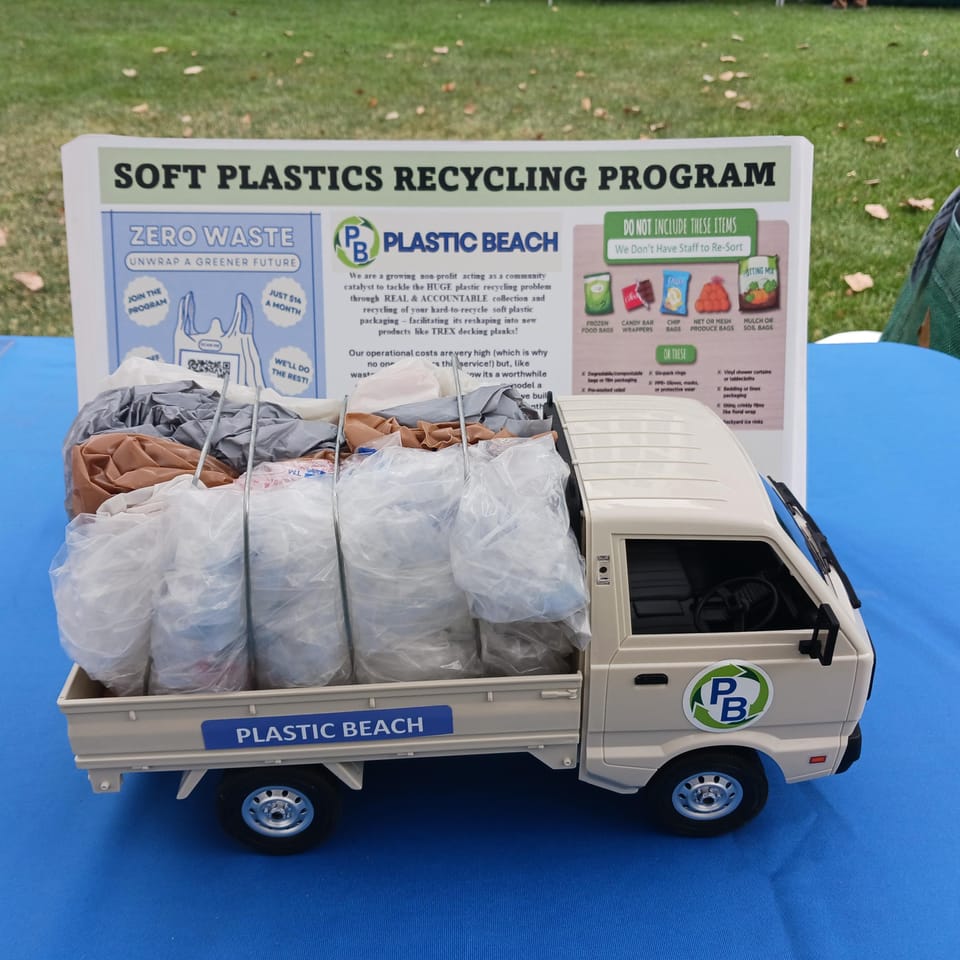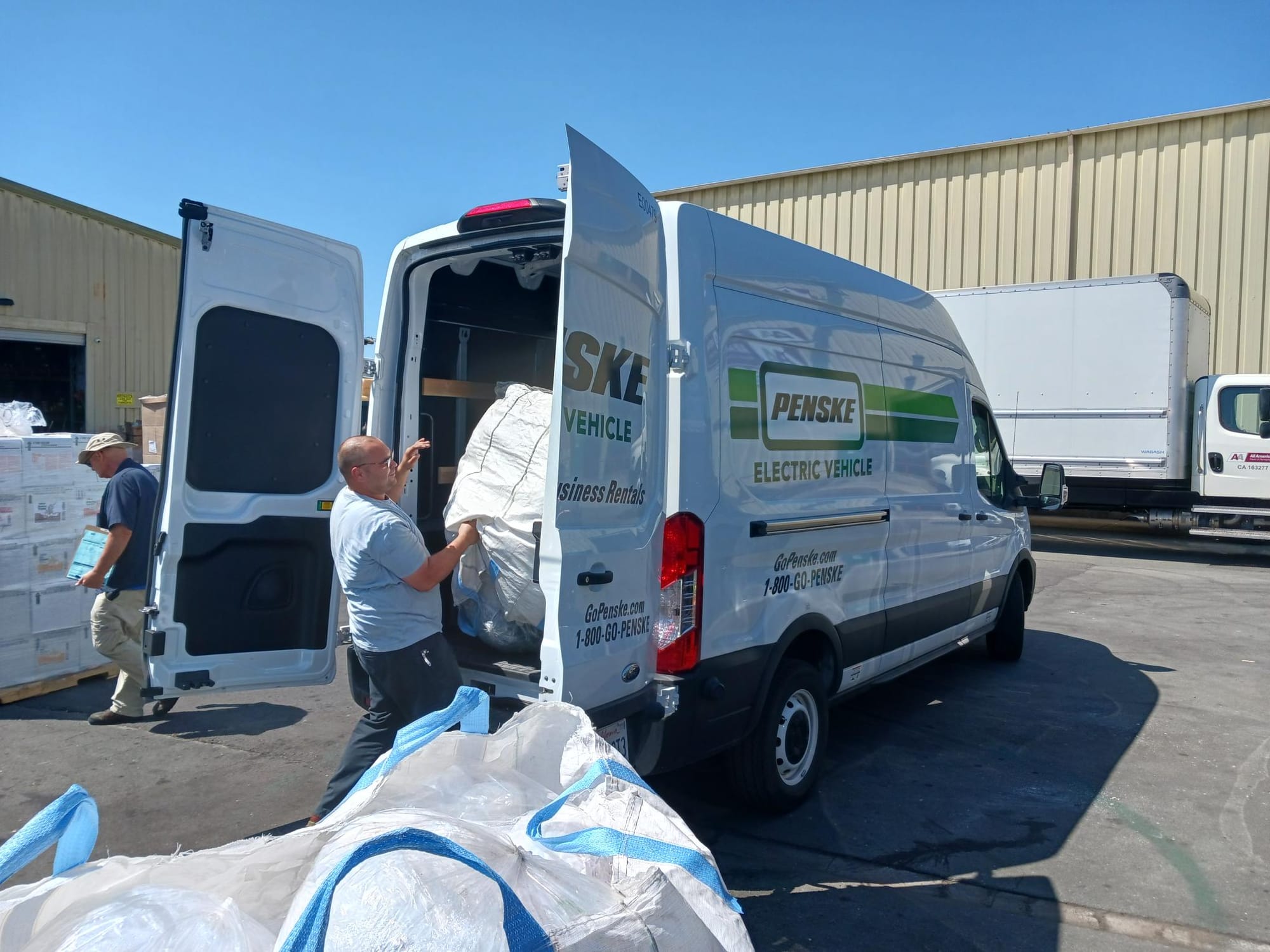Casio on a Plastic Beach: Engaging in Soft Plastic Recycling

By Rise Riyo, Community Outreach Manager, ZeroIn
It was a beautiful spring day when I sat down with Matthew Clough, founder of the non-profit Plastic Beach, at a local cafe in Carlsbad. No clouds, only blue skies and a mild Mediterranean breeze greeting us on the outdoor patio. In any gift shop this picturesque day would be featured on a vintage travel postcard. I imagine if I told tourists that something was looming over this quaint coastal town, I’m sure they’d be unphased and would continue heading toward the nearby beach. I don’t blame them. Who would believe me on a day like this? However, there is indeed something looming among the sightseeing tourists and over the crowded sandy beaches, and that something is called the plastic waste crisis.
The first question I asked Clough was why the name “Plastic Beach” for his organization. “The name comes from an album called Plastic Beach by the British band Gorillaz,” stated Matthew. “Ah,” I replied, shaking my head. His comment intrigued me so I set aside a mental note to listen to the album later. Matthew reached over and handed me two leaflets. He pointed to them and said “This is the bread and butter of the program, This is what we’re trying to focus on, The gist of it.” I quickly glanced at the information and set it aside. “Ok, thank you,” I replied, “but let me hear it from you.”
Matthew began explaining the urgency of properly disposing of “soft plastics”. Soft plastics is a term that describes low-density polyethylene (LDPE) and high-density polyethylene (HDPE) plastics that can be scrunched up by hand into a ball. From plastic grocery bags to produce bags to packaging wrap, soft plastics are ubiquitous in our society, and from research studies and recent media coverage, soft plastics are not being properly disposed of. In fact, it’s quite the opposite of what is mentioned in public relations campaigns of the petrochemical and plastic industries whose main purpose is the production of virgin plastic products.
Clough continued stating in 2014 California was the first state in the country to ban single-use plastic bags with Senate Bill (SB) 270.[1]
By law, it’s been mandated that any grocery store located in the state of California that hands out soft plastic grocery bags must provide a bin to the consumer who can then return these bags for recycling.
“However, the truth is that many supermarkets don’t openly advertise this service nor do they place soft plastic recycling bins in areas visible to the consumer,” explained Clough. “Instead, these bins are often tucked in an area that is often hidden away from the public.” I pointed out to Matthew that my local Sprouts has their bag bin located just outside the store doors. “Yes, but the bags that you place in recycling bins at any grocery store may not even end up where they’re supposed to,” emphasized Matthew.
The Los Angeles Times reported that “[b]y 2022, Californians were throwing out 462 million plastic pounds of plastic bags, a 47% increase,” and furthermore, “[m]ost recycling centers don’t recycle these bags.”[2] Since 2020 ABC News has been investigating the plastic waste trade. A team at ABC news and nine of its affiliates placed 46 digital tracking devices into plastic disposable bags sourced from Walmart and Target store drop-off recycling bins in the US. These same bags ended up in Malaysia and Indonesia carelessly thrown in ad hoc and unmonitored landfills near ocean shores and indigent villages.[3]
In October 2023, The Economist ran a segment on its YouTube Channel that investigated the overflowing problem of plastic waste and its mismanagement and unregulated dumping of plastic waste in landfills, along the coasts, and in the oceans around the world.[4] In February 2024, the Center for Climate Integrity released a 68 page report documenting how the petrochemical and plastic industries colluded together to deceive the public for decades and have continued to deny responsibility for the plastic waste crisis.[5]
Even this year’s Earth Day centered on the theme, “Planet vs Plastics” as a wake-up call to the public[6], and a recent article published in The Hill reported the top five companies such as Coca-Cola and its use of plastic as the source of 24 percent of global plastic waste.[7]
Not to overwhelm the reader, but the plastic waste crisis is our reality. So how can we address it? Clough stated there is a simple, feasible solution to plastic waste. His non-profit, Plastic Beach, offers businesses, small and large, and residents in greater San Diego County the service of disposing of their soft plastics with the guarantee that their soft plastics will be properly dealt with throughout the entire non-profit’s pipeline.
For a small subscription fee of $14/month, residents can hand over their soft plastics to Plastic Beach through its two drop-off locations in North County San Diego and one drop-off location in North Park. Clough pointed out to me that “[t]he subscription cost is equivalent to a Doordash delivery, if you really think about it.” Businesses of any size can also participate in a pick-up service right from their offices and stores with Plastic Beach.
More importantly, Plastic Beach provides statistics to residents and businesses of their plastic footprint. “We give them stats, because that’s what we’re big on. We’re going to communicate those statistics back to you, because we want you to use them. And be proud of them, you know.”
Plastic Beach was finally recognized for its crucial role in addressing the plastic waste crisis. The nonprofit was recently the recipient of a two-year grant from the mission-driven NGO, The Recycling Partnership located in Washington, D.C.. With this grant Plastic Beach is able to purchase needed operational equipment, expand their nonprofit business model by leasing a larger, suitable warehouse, reduce their carbon footprint by driving an EV van for collections, and drastically increase community awareness of the plastic waste crisis, and of the nonprofit itself, through marketing.
In the greater San Diego area, businesses alone are just giving plastic along with their products. And as consumers, we are just throwing away what the businesses are giving to us, i.e., their plastic. So accountability is being handed down to us, the consumers.
With the California ban on plastic bags, businesses will no longer hand the bags out – which means that these same businesses do not have to have a recycling collection bin for consumers to recycle their plastic. Consumers will no longer have anywhere to recycle their soft plastics. Hence, soft plastics are quickly filling up our local landfills. However, Plastic Beach can step in and provide their service of recycling and disposing soft plastics to consumers and businesses. The nonprofit has already been doing it for some businesses.
Located in Encinitas on Pacific Coast Highway, Hansen Surfboards uses Plastic Beach to haul away their soft plastics. Every week Plastic Beach collects two large curbside bins of soft plastic. “[T]hat is approximately eight times the container size of a grocery store,” stated Matthew. “We can say one store selling clothing generates twelve hundred pounds a year. And we have thousands of these stores…in our community. That’s 12,000 pounds right there.”
For grocery stores, Plastic Beach provides service to Jimbos, a grocery store founded in 1984 by Jim “Jimbo” Someck in North Park. Jimbos now has five stores in San Diego County. Plastic Beach carries away nearly a thousand pounds per week from the grocery store. Imagine what other grocery stores could be handing over, especially the big chain stores like Costco, Target, and others in the greater San Diego area. It’s staggering, if you let the numbers sink in deeply.
For the past three years, residents have been handing over their soft plastics to Plastic Beach at Solano Center for Environmental Innovation located in Encinitas. “We’ve been running a high-end collection service there where we’ve been collecting about three yards of plastic every month,” stated Clough. “So that’s about two or three hundred pounds of plastic every month from [local] residents.”

So here we have a nonprofit business model that has a simple, working, reliable solution to recycle soft plastics properly. In the last two and half years, Plastic Beach has recycled over 30 tons of soft plastic waste. “We’re showing that it can be done,” states Clough. “And we want copycats to go and do it in their own cities.”
But why hasn’t every business or resident jumped on the bandwagon to join in the fight against plastic waste? Why aren’t more businesses engaging in waste minimization? Why haven’t local city councils collaborated with Plastic Beach through sponsorship? Matthew summed it up to inertia among the masses, expensive costs if the process is implemented in-house for businesses, and the lack of policies and regulations from the local, county, and state levels.
Clough continued stating, “We need to begin and continue having conversations in our families, our communities, and with our leaders.” Imagine drop-off recycling bins for soft plastics stored at every community church. We need to make the business model of Plastic Beach ubiquitous by providing it as an option to the public and local city councils in addressing the plastic waste problem.
Clough talked about hope, his hope. “We’re aiming five years down the line where, A, we go out of business, and B, [the consumer] is paying $1, [instead of] $14.”
Matthew and I sat back in our patio chairs outside the cafe. The Mediterranean breeze was still blowing gently around us on such a beautiful day. There was a feeling of defeat looming over me, if not the two of us. I thanked him for taking the time to sit with me, and we parted ways.
After the interview, I went home and listened to all of the tracks on the Gorillaz' Plastic Beach album, in particular, the piece, “Plastic Beach”:
“To the dark, dark seas
Comes the only whale
Watching ships go by
It's the day we try
It doesn't know, it's a Casio on a plastic beach
It's a Casio on a plastic beach
It's styrofoam deep sea landfill
It's styrofoam deep sea landfill”[8]
For one month, I told myself, let’s see how much my family and I are handed soft plastics from the many, many Amazon retail stores and our visits to the local grocery store. From there, I began collecting my soft plastics. Then I started to post about Clough’s nonprofit organization, Plastic Beach, on my social media accounts. There weren’t many, but I got a few hits from individuals on Nextdoor and Facebook who were interested. If you’d like to hop on the bandwagon with me, hit me up at rise@zeroin.earth.
Website: https://www.plastic-beach.com/
Instagram: @itsplastic_beach
Facebook: https://www.facebook.com/501c3plasticbeach
Solid Waste: Single-Use Carry Out Bags. Senate Bill (SB) No. 270, Chapter 850. (Cal. Stat. 2014). ↩︎
Carroll, Tom. (2024 February 21) “Did California’s plastic bag ban make plastic waste a bigger problem?”, Los Angeles Times. Retrieved May 1, 2024 from https://www.latimes.com/environment/plastic-bag-ban-waste-404-123 ↩︎
ABC News Investigation. (2024 April 23) “Trashed: The Secret Life of Plastic Exports”. Retrieved May 1, 2024 from https://abcnews.go.com/International/video/trashed-secret-life-plastic-exports-109553298 ↩︎
“Who is polluting the ocean with plastic?” YouTube, The Economist, 11 October 2023, https://youtu.be/uRE_DndxwaA?si=eqywxHGLpljVWdXg ↩︎
Allen, Davis, PhD, Naomi Spoelman, Chelsea Linsley, and Alyssa Johl. (2024, February) “The Fraud of Plastic Recycling: How Big Oil and the plastics industry deceived the public for decades and caused the plastic waste crisis.” Center for Climate Integrity. Retrieved May 1, 2024 from https://climateintegrity.org/plastics-fraud ↩︎
King, Charlie. (2024 April 22) “Earth Day 2024: Planet vs Plastics”. Sustainability Magazine. Retrieved May 1, 2024 from https://sustainabilitymag.com/articles/earth-day-2024-planet-vs-plastics ↩︎
Budryk, Zack. (2024 April 29) “5 companies create a quarter of plastic pollution: Study”. The Hill. Retrieved May 1, 2024 from https://thehill.com/policy/energy-environment/4629925-five-companies-quarter-plastic-pollution-study/ ↩︎
Damon and Jamie Hewlitt of Gorillaz. (2010 March 3), “Plastic Beach” from Plastic Beach. Retrieved May 1, 2024 from https://www.musixmatch.com/lyrics/Gorillaz-feat-Mick-Jones-and-Paul-Simonon/plastic-beach-mick-jones-and-paul-simonon ↩︎
